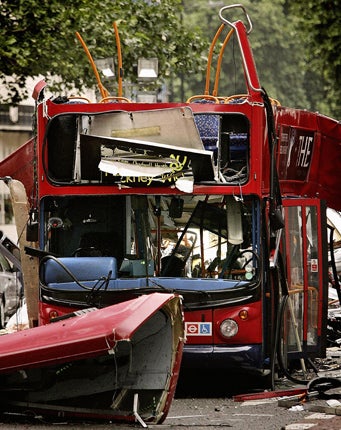Victims' deaths could not have been prevented, says coroner

As relatives wiped away tears and survivors sat with heads bowed, a coroner yesterday ruled none of the 52 victims of the 7 July bombings could have been saved by a faster response from rescuers but MI5 and emergency services need to improve procedures in the face of the continuing terrorist threat.
Lady Justice Heather Hallett ended five months of evidence by concluding that each of the dead had been unlawfully killed in a "dreadful act of terrorism" and no "failings on the part of any organisation or individual caused or contributed to any of the deaths".
The core findings, announced to a courtroom packed with 70 family members of those murdered by four Islamist extremists in a morning rush hour in 2005, disappointed those who believed the testimony had justified the placing of some of the blame for the killings on the security service and response of emergency services.
Instead, in 77 pages of concluding remarks and recommendations Lady Hallett paid tribute to the "quiet dignity" of the bereaved families and outlined nine improvements in the protocols of MI5, the 999 services and London Underground which she said "may save lives".
Despite testimony that fatally injured victims of Mohammed Sidique Khan and his three co-conspirators waited in some cases for more than an hour before emergency workers reached them, the coroner said she had reached the "sad conclusion" that the injuries suffered by the 52 dead meant they wouldn't have survived.
Lady Hallett (pictured) said the proceedings had provided answers to many of the questions raised about the events that led up to the attacks and what happened on the day. But she said shortcomings, from the chaos caused at Kings Cross station by the lack of a rendezvous point for 999 workers to the lack of availability of stretchers, needed to be addressed.
A separate 65-page document described the MI5 surveillance operations and tip-offs prior to July 2005 that led to officers photographing Khan, the ringleader of the plot, and his second-in-command Shahzad Tanweer, at a motorway service station in February 2004. The coroner criticised MI5 for some of its procedures, including the way in which in 2004 it showed a badly cropped picture of Tanweer to an informant, Mohammed Junaid Babar, who had attended a terrorism training camp with Khan and might have identified the future bomber. The coroner asked for improvements to the keeping of MI5 records about how targets for surveillance are prioritised.
And she called for the provision of first aid kits on Tube trains and measures to confirm electric current on the Underground had been switched off.
As Lady Justice Hallett ruled that the 52 victims of the July 7 bombings were unlawfully killed, she asked for their names to be read out. It was an act which served as a reminder of the diverse backgrounds of those killed: "James Adams", "Benedetta Ciaccia", "Shahara Islam", "Anat Rosenberg", "Laura Webb", "Gladys Wundowa".
But for many of the bereaved families and survivors, the conclusion of the inquest did not bring closure. Marie Fatayi-Williams, whose son Anthony was killed on board the bus onTavistock Square, said the inquest findings had "brought us only to the foothills of the issues we need to look at".
John Taylor, 62, left court after hearing that his only daughter, Carrie, 24, could not have been saved even if treated by paramedics earlier.
He said: "There were probably 17 people who would have been alive for up to an hour after the explosions and before the emergency services came. The court talks about the 'balance of probabilities' but there are no absolutes."
Tim Coulson, 56, was at Edgware Road travelling on a Tube in the opposite direction when he smashed a window to clamber into the bombed train and assist those who lay injured.
He said: "It is comforting to know that no one else would have been prevented from dying if things had been done differently."
London Mayor Boris Johnson said: "I would like to reassure all Londoners and visitors to our great capital that much has changed in our emergency protocols, procedures and equipment since that day."
Join our commenting forum
Join thought-provoking conversations, follow other Independent readers and see their replies
Comments
Bookmark popover
Removed from bookmarks